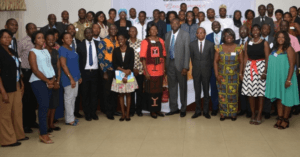International Conference on non-communicable diseases ends in Accra
 An international conference on: “Food Security, Dietary Practices and Non-Communicable Diseases (NCDs),” has ended in Accra, with a high-programmed action to make proper nutrition a cornerstone for healthy living plan.
An international conference on: “Food Security, Dietary Practices and Non-Communicable Diseases (NCDs),” has ended in Accra, with a high-programmed action to make proper nutrition a cornerstone for healthy living plan.
The initiative was aimed at checking malnutrition, which is a major challenge in Africa.
The conference sponsored by AstraZeneca and Edusei Foundation, was to raise awareness of the link between food security, insufficient diet quality and NCDs with its serious impact on health and socio-economic development in Ghana.
The conference devised strategies that are needed to control NCDs in the country.
The event was moderated by Dr Matilda Asante, Senior Lecturer at the Department of Nutrition and Dietetics, School of Biomedical and Allied Health Sciences, University of Ghana and Past Vice President, Ghana Dietetics Association.
Dr Margaret Udahogora, Director of Dietetic Programme, Department of Nutrition and Food Sciences, University of Maryland, College Park, US, in a keynote speech highlighted the modifiable risk factors for NCDs in both high and low income communities and the role of food security and a multi-sectoral approach to NCD prevention.
She noted that food security includes four pillars of availability, accessibility, utilisation and stability to meet nutritional needs.
There was a panel discussion comprising Dr Ebenezer Appiah-Denkyira, Director General, Ministry of Health, Dr. Francis Appiah, College of Agriculture and Natural Resources, Kwame Nkrumah University of Science and Technology; Dr Gladys Peprah Boateng, former Chief Dietitian, 37 Military Hospital, and Dr Iristide Ekow Essien, a UK Community Development, Policy Development, Social Enterprise Specialist.
They called for the need to strengthen a multi sectoral commitment for combating NCDs by scaling up action across the various government and private sectors.
The panelists highlighted the challenges of attaining food security for regular utilisation of safe and nutritious foods as well as the health related consequences such as under nutrition, overweight/obesity, diabetes, high maternal mortality and other NCDs.
Issues relating to curative (rather than preventive) care were addressed and they called for a stronger public health institution, quality of health care and improved capacity in policy making and implementation, with responsive and equitable health systems.
The conference was the first of its kind being hosted under a public private partnership of Let’s Go Africa Foundation, School of Biomedical and Allied Health Sciences, Ghana Institute of Horticulturists and the Ghana Dietetic Association – sponsored by the private sector and major NGO.
Expert delegates from governmental agencies and scientific societies came from Ghana, US, United Kingdom and the State of Qatar.
During the break sessions, AstraZeneca, a sponsor of the conference, spelt out evidence relating to the magnitude and impact of NCDs on health and on the economy of African countries and efforts by the company to roll out a healthy heart programme in all African countries.
AstraZeneca spoke about its Enidaso medical programme in Ghana and multimedia videos were shown to enhance learning materials on NCDs in Africa.
Delegates were thrilled to hear about the social protection programme in Ghana by Edusei Foundation, on its educational workshops that has reached and trained about 5000 youth in the country and the Diaspora and Edusei Foundation International Centre at Bekwai in the Ashanti Region.
A short video captivated the audience.
The conference ended with the participants developing an action plan and endorsing strategies to address the challenges faced by the enormity of NCDs and their subsequent social and economic impact in Ghana.
The concept of food-based dietary guidelines in Ghana, increased advocacy, high impact interventions, and collaboration were suggested in an actions plan to promote healthy nutrition and a healthy lifestyle.
Source: GNA
